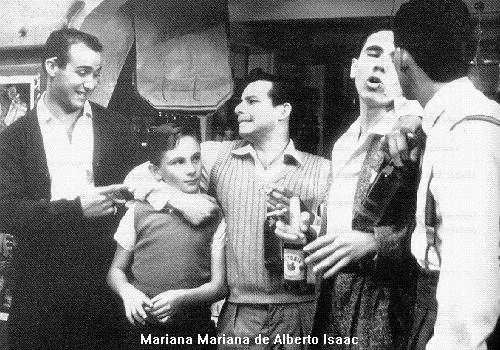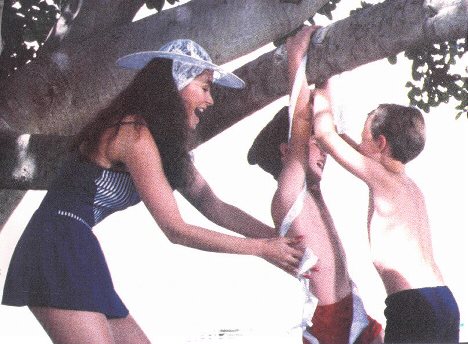Mariana, Mariana
(Imcine, 1986) Prod: Héctor López Lechuga; Dir: Alberto Isaac; Scr: Vicente Leñero; Orig Novel: José Emilio Pacheco ("Los batallas en el desierto"); Photo: Daniel López; Music: Carlos Warman; Prod Mgr: Gerardo Barrera; Post-Prod Advisor: Claudio Isaac; Asst Dir: Luis Gaytán; Film Ed: Carlos Savage; Prod Des: Anna Sánchez; Art Dir: Xavier Rodríguez; Decor: Jorge Morales; Camera Op: Angel Goded; Lighting: Antonio Alvarez; Makeup: Sara Mateos; Sound: Daniel García; Sound Ed: Javier Patiño; Union: STPC
CAST: Pedro Armendáriz [Jr.] (Carlos in 1986), Elizabeth Aguilar (Mariana), Saby Kamalich (mother), Aaron Hernán (father), Luis Mario Quiroz (Carlos in 1948), Fernando Palavicini (Rosales in 1986), Héctor Ortega (priest), Ignacio Retes (psychiatrist #2), Juan Carlos Andrews (Jim), José Luis Cruz (Prof. Mondragón), Adolfo Olmos (Rosales in 1948), Isabel Andrade (Isabel), Roberto Palazuelos (boyfriend), Dinorah Corti (Rosa María), Gerardo Quiroz (Héctor), Angeles González (psychiatrist #1), Mariana Luisella (Estelita), Ernesto Gómez Cruz (gardener in Tequesquitengo), Corina Mendoza (Clara), Jorge Rocha (Jim's father), Andrés Sánchez (Alcaraz, student), Jun Kawabe (Toru, student), Cuautli Arau (Alberto, student), Salvador Rodríguez (Ayala, student), Julio Monterde (director of school), Agustín Silva (don Sindulfo, concierge), Alejandro Ripstein-Bruno Bichir-Yamil Atala (Héctor's friends)
NOTES: Although this project was taken over by Alberto Isaac after the death of director José Estrada (to whom the film is dedicated), it nonetheless contains some distinctive Isaac touches. Perhaps this is what attracted Isaac to the film (and the producers to Isaac). Once again, there is a period setting (most of Isaac's films), in which the sexual awakening of a young person is a central part of the story (Los días del amor, Las noches de Paloma, Tiempo de lobos). Sex, romance, and violence are interconnected, as in almost all of Isaac's films (comedies and dramas alike). In common with Isaac's previous work, the film contains many small details of daily life--in one scene, Carlos' family gets a juicer, and in another, they get their first electric vacuum cleaner--although I would not want to say that some of these weren't in Vicente Leñero's script or José Emilio Pacheco's novel.
1986: Carlos arrives late for his father's funeral in Mexico City. He is greeted by Rosales, a former schoolmate. As Rosales is giving Carlos a lift, they talk about old times. The rest of the film is chiefly a flashback to 1948, with occasional brief scenes between Carlos and Rosales in the car in 1986.
1948: the young Carlos lives with his mother, father, sisters, and teenage brother Héctor (mid-way through the film, Héctor is caught in bed with the family's maid, who is summarily fired). His father owns a factory, but Carlos' mother complains that they don't have enough money to send Carlos to an "exclusive" school. The school he attends includes some "lower" class children, including Rosales, with whom Carlos gets into a fight at recess one day.

Carlos' best friend is Jim, whose father is a powerful politician. Jim's mother Mariana is not married to his father (Carlos' mother says she is like a "second front," and not only that, there is also a "third front" and even a "fourth front"). One day, Jim invites Carlos to the apartment where he lives. Carlos is awestruck by the beautiful Mariana; he steals a photo of her from Jim's room, and begins to dream about her. In one scene, he changes the radio from a humorous program--"Panzón Panseco" (an actual show)--to one playing romantic songs with lyrics such as "Estoy obsesionado contigo" (I'm obsessed with you). He also spends time with Jim and Mariana at their vacation home on the shores of Lake Tequesquitengo.
Back in school, Carlos continues to think about Mariana. One day, he skips class and goes to her apartment to see her. He declares his love, but she kindly explains why it is impossible, and kisses him affectionately. He leaves in a daze and goes home. However, his teacher (and Rosales) discover what has happened, and they inform his parents, who are outraged ("Carlos committed a barbarous act!" his mother says). His father remembers that Carlos was dropped on his head when he was 6 months old, and speculates that he might be mentally defective.
In the confessional, the innocent Carlos can't comprehend the priest's questions ("You haven't told me any details. Was she nude? Was there a man in the apartment?"). He's then taken to see two psychiatrists, who have radically different opinions of him but finally say "basically we agree." Based on their report, Carlos' parents enroll him in a Catholic school.

Some time later, Carlos spots Rosales, who has dropped out of school and is selling candy apples on the street. Rosales tells him Mariana is dead. She was at a party and started criticizing Mexico's government and its politicians. Jim's father slapped her and called her a whore, so she went home and slit her wrists. Jim found her, dead. The suicide was hushed up, which is why Carlos never heard about it. Carlos goes to Jim's apartment building, but there is a new concierge and no one knows (or will admit) that Mariana and Jim once lived there.
Back in 1986, Rosales tells Carlos that their old neighborhood doesn't really exist any more: Carlos' house has been torn down, the school was demolished, and many other buildings were either torn down for "parking lots and condos" or destroyed in the earthquake.
Mariana, Mariana is a very well-crafted piece: the production values are excellent, the period of the late 1940s in Mexico City is faithfully and painstakingly recreated both in sets, costumes, and by means of period music. Unlike some films set in the past, none of the actors looks or sounds unnatural or too "modern." The performances are top-notch: although Pedro Armendáriz Jr. has relatively little to do, there are no false notes. Luis Mario Quiroz is particularly natural and unaffected: he received a special Ariel award for his performance (in the early years of the Arieles there were regular categories for Child and Juvenile acting, but these were dropped when the awards started again in 1972). Quiroz received a Diosa de Plata as "revelación" (newcomer) of the year for his role in the movie.
The film also won Arieles for Best Film, Best Director, Best Co-Starring Actress (Kamalich), Best Supporting Actor (Ortega), Best Screenplay, Best Editing, Best Art Direction, and Best Set Decor. Nominations were earned by Elizabeth Aguilar (Best Actress), José Luis Cruz (Best Co-Starring Actor), Angel Goded (Best Photography), and Carlos Warman (Best Music Score).
Back to the Alberto Isaac Page. This review completed 10 May 2001 by David Wilt (dwilt@umd.edu).